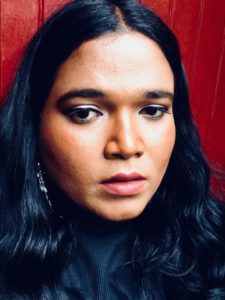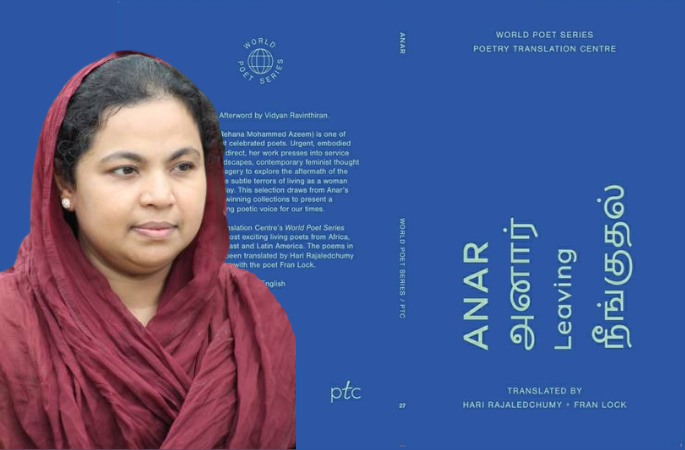My poetry is about that fire known as language, which a woman carries under water.
Anar
Anar’s voice is distinct in the arena of contemporary Tamil poetry. Hailing from Sainthemaruthu, Eastern Sri Lanka, Anar’s poems has a mesmerising allure.
Anar’s poems are primarily poignant expressions of the female body and mind. A voice that defies the societal characterisation of women resonates in her words. Some of her poems are longing for love, some wail about the vacuum of being lonely, and other poems speak about the burdens of being and becoming women.
Anar’s real name is Issath Rihana, and she has published six books of poetry. She has been recognised with multiple awards and nominations for her work in poetry. Among them are Sri Lanka’s National Literature Award, the Canadian Tamil Literary Garden’s Poetry Award, the Aaathmanam Award, India, and the SPARROW Award, India.
Anar comes from the war-torn part of the country, and her poetry articulates the consequences and realities of the 30-year-old civil war.
The new collection Leaving, published by the Poetry Translation Centre, is a compilation of poems from Anar’s five renowned poetry anthologies. They were translated from Tamil to English by Hari Rajaledchumy with Fran Lock. The Poetry Translation Centre gives the best contemporary poems from Africa, Asia and Latin America a new life in the English language, working with diaspora communities for whom poetry is of great importance.

Hari Rajaledchumy is an artist, writer, and poet based in London. She primarily works in installation, text, and poetry. Rajaledchumy was recently an artist associate at the studio-based Open School East programme. Her works have been published in Puthiya Sol (Sri Lanka), Sari Nihar (Sri Lanka), Manal Veedu (India) and Aakkaddi (France).
Fran Lock is the author of several poetry collections, including Contains Mild Peril (Outspoken, 2019), Raptures and Captures (Culture Matters, 2019), and The Mystic and the Pig Thief (Salt, 2014). She earned her PhD from Birkbeck College, University of London, focusing on ‘Impossible Telling and the Epistolary Form: Contemporary Poetry, Mourning and Trauma’.
Anar sees women as elements of the universe. The female body and the female mind are segments of this nature. It is infinite. Wide and deep. Resurfacing with life behind all the wounds and all the destruction. She perceives herself as the endless sky, the deep ocean, the dense forest, the mountain, the seed, the wound, the wind, and the fire. She writes continuously on her blog Anar Official in Tamil.
Sri Lanka isn’t a safe place for Muslims: the Buddhist-Sinhala government targets them as it does Hindu Tamils. It erases their histories and purges from the record violent acts committed against them. So Anar’s poetics is also about becoming ‘nameless’ and ‘shapeless’ in the eye of the state. One doesn’t know always whether to read her from the viewpoint of sexual relations or with an eye to politics; analysing the verse (or translating it), it would be wrong to simplify a wealth of meanings into a single explicable voice. Anar is out to surprise the reader, through sleights-of tongue to demonstrate the connection between the personal and the political.
Vidyan Ravindran in the Afterword
Her poems cannot be boxed into a specific genre. Instead, Anar blends and weaves words as she likes. The imageries and the magical language she chooses in her expressions are captivating.
You can read a few of her poems below
♥
Killing a Woman
Here is a battlefield,
a convenient clinic, a silo
of superabundant supply,
a permanent prison.
Here is a woman’s body,
a sacrificial slab.
The heart’s ache, the pulse
of life, belongs to us both, but
for women it will not take root.
Before my eyes
my murder is happening.
♥
Zulaikha
If you have to know – know this:
I grow beyond meanings.
I am the spark
made from striking stones.
I am a lightning streak
that leaps from here to there.
I have redeemed the years of sin.
I have swept aside all obstacles.
A sybil,
who moves mountains like camels.
I wear the light like a dress,
I am moist as a mound of salt.
I have flung my seasons high,
stars of scorn and pride.
I turn eyes into tempests of love.
I am a dream
that yearns to dream.
My body is red molten lava.
I never
chopped hands or fruits with knives.
I broke the knife with love.
I am she who loves Yusuf
I am Zulaikha.
♥
Woman
When the air starts to cool
anticipating rainfall
I morph into leaf-green.
I am a burgeoning treasure,
under the earth.
I am the sky
that has swallowed up
salt from a mutinous sea.
I am a spell
that is both dream
and poison.
I am opposing
poles of a word,
sending its war cry
out into time.
Where could
I hide myself?
♥
Loneliness is the Colour of Sun
1
At noon,
in my desolation,
hangs a scorching sun, both
calm and fierce.
In the shade, a brief respite,
but loneliness creeps through
the cracks, with its tricks,
as sunlight enters the shuttered
house, and takes a seat at will.
With a petulance that repels
embrace, the sun is a sultry
tyrant. Its dictatorship will
march across every available
surface.
Sweat-beads bloom
in the heat of the day.
In a light that chars my chest
there are no resolutions.
Among tall trees,
The longing sun of the evening
has fallen into fragments
and is flowing out like blood.
This is the great weight
that is my loneliness.
2
In solitude’s tongue
a faint cry falls like snow.
Pallor and tremor,
under the long stairs of the royal palace,
where loneliness takes the form
of a wolf.
Fall season disdains all,
makes the world weep:
the peaks and plateaus
that mimic an endless worry,
the bubbling plane of sky
reflected on the riverbank;
squirrelling sounds.
All
fall and echo
on the window
of loneliness.
3
The missed opportunities
of an inveterate loser will
burst into flames somewhere.
The house sits inside loneliness
like an unheard scream in a shut-
up room set aside for suffocation.
Solitude smoulders,
abandoned even by time.
Like a lone dead tree
I remain in the valley
of solitude.
♥
Leaving
Ants swarm over the day
dreams, dragging away, line
by line, the oozing salt-streams.
They carry the wounds
they have mined to their sand
silos.
Futility is cutting through cartilage.
They smell its blood. They talk
to each other in dreams.
Those who light incense
to themselves know well
why time burns daydreams
into smoke.
These anthill mines
conceal sandstorms.
They migrate and move.
The anthill spits
out dream’s resemblance.
The sand changed its colour.
The ants receive the signals, flee
the anthills.
From the cut wrist
mysteries seep out,
and against the pooling blood
shines the evening sun.
♥
Raindrops on a Cashew Tree
That
was very close to love.
Very close.
You, in the acute kingdom of war.
I, on a journey, surveiled and afraid.
We were writing life: losses weighing
on the soul; dreams wetly swelling
in the eye.
On a night without electricity,
when the autumn falcons cried,
they shot you down.
On the red sand, blood
wrote your final poem.
You died like a pigeon in recoil
in front of your wife and sons;
dry their joint cry welled up,
bursting into this wretched world.
I lost a poet who felt too much.
A grief that could silence a sonorous sea.
That was very close to love.
In the letters you wrote, on midnights
when the dogs howled, there were strange
footstep-sounds and a terrible trembling.
Now your writings whisper to me,
amidst sobbing. On the bed, I jolt
awake in sweat. The indelible darkness
of our separation falls on the hilltops,
again and again.
To place on your simple gravestone,
calm in the cold air, I bring a poem
about truths. I wrote it with silences.
To your wife who cannot part with her pains
I bring a bouquet just as soft as your heart.
To your children, I bring kisses.
In a whirling foggy wind
that passes the cashew tree,
soaked in rainfall, dripping
with raindrops, your eyes
fly over everything
keeping watch.
for Chandrabose Suthagar
♥
You can purchase ‘Leaving’ here



